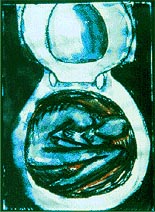The symptoms of bulimia nervosa are often quite difficult to spot. Unlike patients with anorexia bulimic sufferers are usually of normal or higher weight, so the physical symptoms are less noticeable. Though internal bodily functions are still suffering. As a matter of fact people with bulimia nervosa try to hide their symptoms from family and friends as they consider their disease to be shameful. Therefore bulimia nervosa is likely to span over a lifetime unnoticed.
Basically the following signs and symptoms are taken into account in diagnosis of bulimia nervosa:
Basically the following signs and symptoms are taken into account in diagnosis of bulimia nervosa:
- Rapid consumption of excessive amount of high-calorific food secretly from people around
- Uncontrolled food consumption during period of hyperphagia
- Cessation of ingestion only when stomach aches begin to occur, when sleeping, in case of other people around or after vomiting
- Depression and excessive anxiety about body weight
- Sticking to rigid diets
- More-than-10kg fluctuations of body weight
- Interchange of hyperphagia and starvation periods
Gastroenterological manifestations of bulimia nervosa:
- Erosive esophagitis
- Stomach dilation
- Chronic diarrhea (as result of laxative abuse)
- Pancreatitis
- Water-electrolytic balance infringements
- Irritable bowel syndrome
- Constipation
- Hemorrhoids
- Ruptire of the gullet or stomach (rarely)
To confirm the bulimia nervosa diagnosis the following procedures are carried out:
- Nutritional status estimation
- Endoscopy to reveal esophagitis
- Examination of the electrolyte level and acid-base balance to determine water-electrolytic balance infringements
